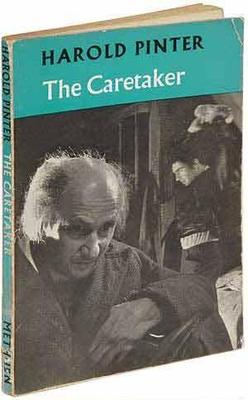
The Caretaker
The Caretaker is a drama in three acts by Harold Pinter. Although it was the sixth of his major works for stage and television, this psychological study of the confluence of power, allegiance, innocence, and corruption among two brothers and a tramp, became Pinter's first significant commercial success.[1][2] It premiered at the Arts Theatre Club in London's West End on 27 April 1960 and transferred to the Duchess Theatre the following month, where it ran for 444 performances before departing London for Broadway.[2] In 1963, a film version of the play based on Pinter's unpublished screenplay was directed by Clive Donner. The movie starred Alan Bates as Mick and Donald Pleasence as Davies in their original stage roles, while Robert Shaw replaced Peter Woodthorpe as Aston. First published by both Encore Publishing and Eyre Methuen in 1960, The Caretaker remains one of Pinter's most celebrated and oft-performed plays.
This article is about the play drama by Harold Pinter. For other uses, see Caretaker.The Caretaker
- Mick, a man in his late twenties
- Aston, a man in his early thirties
- Davies, an old man
27 April 1960
Arts Theatre
Westminster, London
English
A house in West London. Winter.
Interpretation[edit]
In his 1960 book review of The Caretaker, fellow English playwright John Arden writes: "Taken purely at its face value this play is a study of the unexpected strength of family ties against an intruder."[6] As Arden states, family relationships are one of the main thematic concerns of the play.
Another prevalent theme is the characters' inability to communicate productively with one another. The play depends more on dialogue than on action; however, though there are fleeting moments in which each of them does seem to reach some understanding with the other, more often, they avoid communicating with one another as a result of their own psychological insecurities and self-concerns.
The theme of isolation appears to result from the characters' inability to communicate with one another, and the characters' own insularity seems to exacerbate their difficulty communicating with others.
As the characters also engage in deceiving one another and themselves, deception and self-deception are motifs, and certain deceptive phrases and self-deceptive strategies recur as refrains throughout the dialogue. Davies uses an assumed name and has convinced himself that he is really going to resolve his problems relating to his lack of identity papers, even though he appears too lazy to take any such responsibility for his own actions and blames his inaction on everyone but himself. Aston believes that his dream of building a shed will eventually reach fruition, despite his mental disability. Mick believes that his ambitions for a successful career outweigh his responsibility to care for his mentally damaged brother. In the end however all three men are deceiving themselves. Their lives may continue on beyond the end of the play just as they are at the beginning and throughout it. The deceit and isolation in the play lead to a world where time, place, identity, and language are ambiguous and fluid.
Production history[edit]
Premiere[edit]
On 27 April 1960, the first production of The Caretaker opened at the Arts Theatre, in London, prior to transferring to the West End's Duchess Theatre on 30 May 1960. It starred Donald Pleasence as Davies, Alan Bates as Mick, and Peter Woodthorpe as Aston. The productions received generally strong reviews.[7]